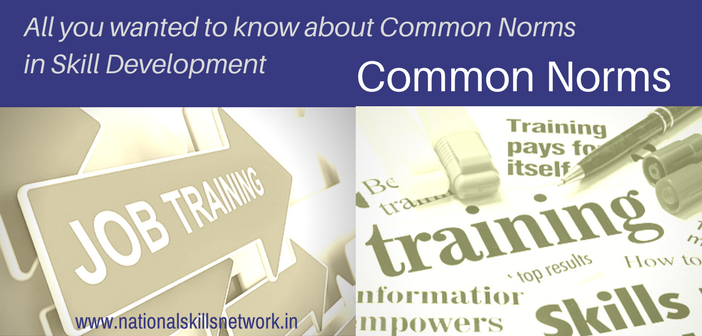In this guest article, Ajay Mohan Goel, Principal Consultant at Skills Management Group, describes the Common Norms laid down in the National Policy of Skill Development and Entrepreneurship 2015. In a simple manner, he explains the significance of Common Norms and it how helps in rationalizing various skill development schemes and central government ministries. Let’s read on to know more about these norms for outcome-based skilling programs.
“There are about 70 different skill development schemes administered by 20 central government ministries/departments. Till 2015, each of these schemes had their own norms for course duration, types of courses, training costs, outcomes and monitoring mechanisms. This caused confusion and lack of uniformity & standardisation among stakeholders including the trainees and employers.” Ajay Mohan Goel
Central government in its National Policy for Skill Development and entrepreneurship 2015, decided to establish common norms for rationalization of various Skill Development Schemes of central government ministries / departments. These included standards for inputs/output, funding/cost norms, third party certification and assessment cost etc, while allowing flexibility to meet the requirements of different parts of the country and its different socio economic groups.
In August 2015, Ministry of Skill Development and Entrepreneurship notified the Common Norms. Subsequently these have been amended twice, with last amendment done in February 2017. Common Norms specify the input standards, outcomes, funding norms, fund flow mechanism, mechanism for monitoring & tracking, and empanelment of training providers & assessors.
 Skill development courses offered by all skill development schemes of central government or its agencies need to align with the National Skills Qualifications Framework (NSQF). Common norms mandate a minimum training duration of 200 hours for courses for fresh entrants and 80 hours for re-skilling / skill upgradation of existing workforce. They also provide for Recognition of Prior Learning (RPL) for persons who have acquired skills through informal or experiential mechanisms.
Skill development courses offered by all skill development schemes of central government or its agencies need to align with the National Skills Qualifications Framework (NSQF). Common norms mandate a minimum training duration of 200 hours for courses for fresh entrants and 80 hours for re-skilling / skill upgradation of existing workforce. They also provide for Recognition of Prior Learning (RPL) for persons who have acquired skills through informal or experiential mechanisms.
Input Standards
Training centers need to have adequate infrastructure & capacity, especially training aids and equipment. The trainers need to have suitable qualifications / experience and need to undergo Training of Trainers (ToT) program. The content should be industry relevant & conform to NSQF requirements. Enrollment of trainees and trainers has been linked to Aadhar. This would prevent frauds and eliminate the possibility of same person enrolling multiple times.
Outcomes from Skill Development
Common Norms have set a target of at least 70% employment (both wage and self) within three months of completion of training, with wages being equal to or greater than prescribed minimum wages. For at least 70% of persons who undergo reskilling or skill upgradation, it targets an increase of a minimum of 3% in wages, within 14 months of training completion. Similar kind of outcomes are defined for persons who are assessed and certified under RPL.
Funding Norms and Fund Flow
Courses have been categorised in three categories (Category I, II and III), based on the level of capital and operational expenditure required for conducting them. The base cost paid per trainee to the training provider is Rs. 42.40, Rs. 36.30 and Rs. 30.30 per hour for courses in Category I, II and III respectively. There is a provision for periodic enhancement in base costs.
Similarly, cities / towns have been categorised in four categories, X, Y, Z and rural areas. For residential courses, boarding & lodging costs are reimbursed per trainee per day at Rs. 300, Rs. 250/-, Rs. 200/- and Rs. 175/- for Category X, Y, Z and rural areas respectively. There is a provision for reimbursement of travel costs for candidates from special areas, BPL candidates and for Persons with Disabilities (PWDs).
For PWDs, additional support to the extent of 10% to 25% of the base cost, based on type of disability is paid. There is also a provision for uniform costs, an amount of Rs. 5000/- per PwD candidate towards personal assistive aids, and Rs. 5,000/- for job outreach activities.
The funds are released batch wise or project wise in three instalments. 30% at the time of batch commencement, 50% on successful certification of trainees and 20% based on placement outcomes. To ensure monitoring and tracking of placed candidates, 10% of the total training cost is released only upon the particulars relating to at least 90% of the candidates of a batch being fed into the integrated MIS.
Third Party Certification & Assessment Costs
Certification and assessment costs to the varying between Rs. 600/- to Rs. 1,500/- is paid directly by the respective ministry to the third-party agency for assessment and certification.
Post-Placement Costs for Special Areas / Groups
To enable the candidates from special areas and special groups to settle down in employment, there is a provision of paying Rs. 1,500/- for upto 3 months based on district of placement and gender of the candidate. For PwDs this amount is Rs. 3,000/- for up to 6 months, based on district / state of placement. These are paid directly to the candidates.
International Skill Training Centres (ISTC)
ISTCs focus on providing skill development courses to Indians seeking jobs overseas. An incentive of Rs. 10,000/- per candidate is paid to ISTCs for overseas placement of such candidates. The assessment & certification in such cases is up to Rs. 3,500/- per candidate. They are also provided pre-departure training at the base cost applicable to category III courses.
Incentive
One interesting feature of common norms is the provision of an incentive for a training partner (TP) for doing better than the target of 70% placement. For placement outcome of 70% to 85%, TP is paid an additional amount of Rs. 3000/- per candidate and Rs. 5,000/- for placement percentage above 85%.
Impact
The different skill development schemes of various central government ministries and its agencies have aligned their schemes to the common norms. Starting with PMKVY 2.0 the flagship scheme of MSDE, to Skil development schemes of National Urban Livelihoods Mission (NULM), National Backward Classes Finance & Development Corporation (NBCFDC), Deen Dayal Upadhyaya Grameen Kaushalya Yojana (DDU-GKY) of Ministry of Rural Development and Integrated Skill Development Scheme (ISTS) of Ministry of Textiles etc. have aligned to Common Norms.
Some of the State Skill Development Missions like Uttar Pradesh Skill Development Mission (UPSDM), HP Kaushal Vikas Nigam (HPKVM), Rajasthan Skill and Livelihoods Development Corporation and many others have already adopted and aligned themselves to the common norms.
Common norms have helped to harmonise the various schemes, and bring base level consistency in input, process and output metrics. This is likely to enable a common framework, improve quality and bring consistency across stakeholders. Bio-metric validation of Aadhar numbers will eliminate multiple enrolments by the same candidate across different schemes. This could in future also build the MIS and database of the candidates for the skill trainings taken by them and track the impact on their career growth. Alignment of courses, assessment and certification with NSQF will enable mobility of skilled candidates across states and simplify recruitment criterions for employers.

















